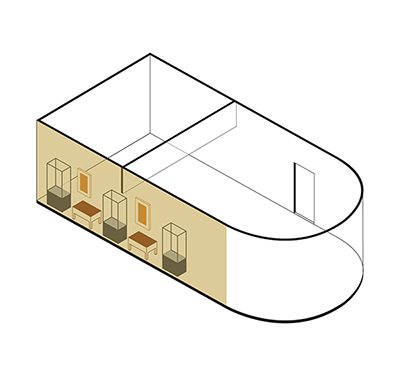ABS 013
Code: ABS 013
Country: Tibet (central)
Style:
Date: 1300 - 1400
Dimensions in cm WxHxD: 15.4 x 21.5 x 8.3
Materials: Brass; eyes inlaid with silver, lips with copper
Shyama Tara
Shyama Tara - or the Green Tara (the saviour, the liberator) reacts like an echo and helps with the speed of the wind. Green is the colour of awakened activity, of active compassion. She accompanies sentient beings like the moon revolves around the earth.
Her left leg rests in the posture of meditation, thus testifying to her renunciation of passion. She holds her right leg propped up in the boddhisattva posture, showing her readiness to rush to help at a moment's notice. Her right hand forms the mudra of gift-granting (varada-mudra), and with her left hand she shows the mudra of refuge-bestowing (sharanagamana-mudra). The three remaining raised fingers represent the three jewels: Buddha, Dharma and Sangha. Water lilies blossom above her shoulders. She is one with her mantra: OM TA RE TU TARE TURE SOHA. Lay people can call upon her for help in times of need by simply uttering her name with devotion.
Tara is a boddhisattva who, according to tradition, vowed to manifest as a female until all beings are liberated from samsara. The devotion for Tara was popularised in Tibet by the Indian scholar Atisha (982-1054) from Vikramashila Monastery, who taught in Tibet from 1045 until his death.
Tara is a generic name for a hindu deity described in Tibetan Buddhism under 21 different forms, each with a different appearance and function, and the Green Tara (literally the “dark Tara”) is the source of all of them. She is the consort of the Buddha Amoghasiddhi and belongs thus to family of activity, but she can also be attributed to Buddha Amitabha and therefor to the lotus family.
Shyama Tara - or the Green Tara (the saviour, the liberator) reacts like an echo and helps with the speed of the wind. Green is the colour of awakened activity, of active compassion. She accompanies sentient beings like the moon revolves around the earth.
Her left leg rests in the posture of meditation, thus testifying to her renunciation of passion. She holds her right leg propped up in the boddhisattva posture, showing her readiness to rush to help at a moment's notice. Her right hand forms the mudra of gift-granting (varada-mudra), and with her left hand she shows the mudra of refuge-bestowing (sharanagamana-mudra). The three remaining raised fingers represent the three jewels: Buddha, Dharma and Sangha. Water lilies blossom above her shoulders. She is one with her mantra: OM TA RE TU TARE TURE SOHA. Lay people can call upon her for help in times of need by simply uttering her name with devotion.
Tara is a boddhisattva who, according to tradition, vowed to manifest as a female until all beings are liberated from samsara. The devotion for Tara was popularised in Tibet by the Indian scholar Atisha (982-1054) from Vikramashila Monastery, who taught in Tibet from 1045 until his death.
Tara is a generic name for a hindu deity described in Tibetan Buddhism under 21 different forms, each with a different appearance and function, and the Green Tara (literally the “dark Tara”) is the source of all of them. She is the consort of the Buddha Amoghasiddhi and belongs thus to family of activity, but she can also be attributed to Buddha Amitabha and therefor to the lotus family.






